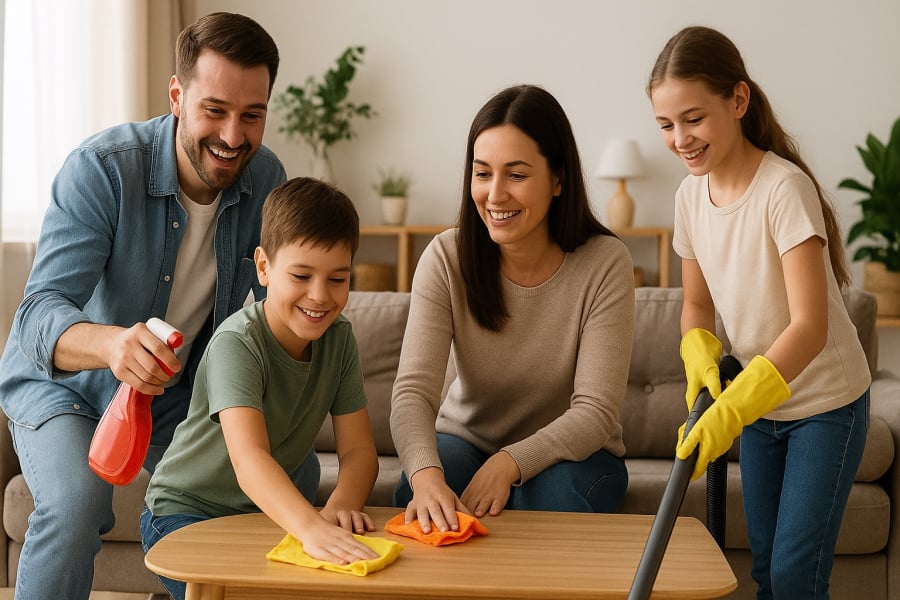Effective Communication: Nurturing Empathy in the Midst of Hectic Modern Life
In the whirlwind of daily life, it’s easy for parents to get caught up in providing for their children’s material needs while neglecting their delicate emotional needs. Unintentional harsh words and impatient frowns can inadvertently leave deep impressions on young minds, causing children to withdraw, lose confidence, and gradually become disconnected from their families.
So, how can we become true companions on our children’s journey? Let’s explore this through the insights of experts and heartfelt real-life stories, where communication serves as a bridge of love between parents and children.
Refrain from Hurtful Scolding That Wounds Tender Hearts
Try to put yourself in your child’s shoes. How would they feel if, every time they made a mistake, they were scolded or compared to others? According to research cited by Zing News, when children are frequently criticized, their brains activate a “fight or flight” response, leading to rebellion, withdrawal, or a lack of receptiveness.
On the other hand, when children sense calmness and understanding from their parents, their nervous system relaxes, creating an environment conducive to healthy brain development and emotional stability.
“Each word from parents is like a small seed sown into their children’s souls,” shares a child psychology expert. “When parents sow seeds of positivity and trust, children grow up with confidence and strong inner strength.”

Maintain Calm and Create a “Safe Space” for Your Child’s Development
Ms. Le Thi Minh Nguyet, a mother from Ho Chi Minh City, recounts an experience that changed the way she communicates with her child: “When my child spilled a glass of water on the floor, instead of scolding them, I said, ‘It’s okay, let’s clean it up together.’ To my surprise, my child didn’t cry but eagerly fetched a cloth to help.”
This moment not only taught the child about responsibility but also highlighted the impact of a parent’s emotional stability in creating a safe environment for learning and making mistakes.
Positive Feedback: A Powerful Tool for Parents to Nurture Children’s Thinking and Resilience
Ms. Mai Lan, a primary school teacher in Hanoi, shares her approach to praising her child after a math test: “Instead of just saying ‘well done’ for their score of 7, I pointed out the parts they got right and gently suggested how to improve the incorrect parts. This made them more enthusiastic and proactive about learning from their mistakes.”
This is an example of a “thinking guidance” system for children, where praise not only brings joy but also directs the development of inner strength and independent thinking skills.

Communicating Through Active Listening: Building a Bridge of Trust
On a rainy afternoon, a young boy returned home looking glum after being teased by his peers. Instead of lecturing or imparting moral lessons, his mother simply hugged him tightly and said, “I know you did your best, and I’m proud of you.” These heartfelt words helped the child feel understood and safe to continue opening up. This is the essence of the strongest connection between parents and children: empathy.
The Four Golden Elements of Nonviolent Communication: Observation, Feeling, Need, and Request
Nonviolent Communication (NVC) helps parents shift from reacting to connecting. Instead of judging your child as “lazy,” try observing: “I see you’re tired after school,” feeling: “I’m concerned you’re not getting enough rest,” and making a request: “Let’s plan a balanced schedule for studying and resting.”
Mr. Tran Van Hoang, a father of two, shares his experience: “I stopped forcing my children to fit a mold and started observing their process. Gradually, they became more proactive and trusting.”
A Positive Emotional Environment: Fertile Ground for Growth
No matter how busy you are, make time to truly listen to your children, not to judge but to understand. A warm home provides not just material needs but also emotional presence. When children grow up surrounded by love, they develop self-confidence, strong opinions, and the resilience to face life’s challenges.
Expert Thu Ha emphasizes, “Friendly communication is the most effective form of education, and it comes not from theory but from the heart of parents.”
Conclusion
As parents, we don’t have to be perfect, but we should be mindful of our words and actions. Every time we choose to listen instead of command, to accompany instead of order, we sow seeds of love in our children’s hearts.
Parents are the first teachers of love for their children. If we set a good example, our children will grow up with strong hearts and learn to love others.
- Cultivate a nightly habit of chatting with your child for just 10 minutes, but make those minutes count.
- Instead of asking, “Did you get any bad grades today?” try inquiring, “Was there anything that made you happy or sad today?”
- Before offering advice, encourage self-reflection by asking, “How do you feel about what you did?”
If you want your child to trust and confide in you and develop to their full potential, it all starts with how you communicate with them today.





































